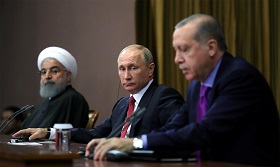Iran has long been a headache for U.S. strategic planning in the Middle East. A new round of debates on Iran’s malign influence in the region was sparked by several correlated events: the relative decline of global role of the U.S., its decision to reconsider existing commitments to regional allies, and the recent rise of Iran's profile in major conflicts in the Middle East. Iran is not an ordinary player, primarily due to its peculiar political regime, its ideological vision for the region, and its impressive immunity to outside pressure. The U.S. has been signaling that it would not stay passive if Iranian expansion challenged American interests in the Middle East. However, the U.S. has also been clear that it would not seek direct confrontation with Tehran, relying instead on cooperation with other regional players. This renders it imperative to assess what role Turkey, a major NATO ally, is going to occupy in the future with regards to U.S. plans to limit Iranian expansion in the Middle East.
Iran has long been a headache for U.S. strategic planning in the Middle East. A new round of debates on Iran’s malign influence in the region was sparked by several correlated events: the relative decline of global role of the U.S., its decision to reconsider existing commitments to regional allies, and the recent rise of Iran's profile in major conflicts in the Middle East. Iran is not an ordinary player, primarily due to its peculiar political regime, its ideological vision for the region, and its impressive immunity to outside pressure. The U.S. has been signaling that it would not stay passive if Iranian expansion challenged American interests in the Middle East. However, the U.S. has also been clear that it would not seek direct confrontation with Tehran, relying instead on cooperation with other regional players. This renders it imperative to assess what role Turkey, a major NATO ally, is going to occupy in the future with regards to U.S. plans to limit Iranian expansion in the Middle East.
Washington's concerns over rising Iranian influence following the nuclear deal were prompted by several trends. The primary issue was Iranian technological advancement that could likely improve the regime's strike and deterrence capabilities. A further subject of concern is Iran's expanding clandestine subversive activity in a number of countries around the Middle East, where Iranian proxies rely on Tehran's assistance and expertise. Iranian operations in the region are supported by efforts to infiltrate regional polities by creating subnational political and military parties with specific agendas and allegiances.
Finally, as previous experience dealing with Iran suggests, its political regime is highly adaptive to outside pressure. The concept of the Resistance Economy equips the regime with tools to withstand economic sanctions, rendering this internationally accepted coercive tool in the U.S. diplomatic arsenal less effective. It is not only that the regime is empowered vis-à-vis its domestic political challengers. Iran has managed to develop ties with other regional and global players, making plans to isolate Iran less sound.
The Trump administration, though it has not demonstrated good comprehension of the region’s politics, seems to act against Iran based on its evaluation of past attempts to limit a rising regional power with malign intents. The principal element of the new anti-Iran policy includes directed sanctions against critical elements of the regime that both enjoy a dominant position within the Iranian domestic political system and serve as a medium for the regime's foreign policy. Another essential part of the forthcoming U.S. strategy to counter Iran is directly linked to Washington's limitation of its direct involvement in the region.
The U.S. administration intends to facilitate coordination between major regional powers, which fear Iran may pose a serious threat to their own interests. In this vein, pan-Arab solidarity and Saudi involvement in Iraqi politics may be facilitated further. Against this background, Turkey's role in the U.S. bid to inhibit the rise of Iran is likely to be further scrutinized by decision-makers in both countries.
The issue, of course, cannot be explored without turning to the history of U.S.-Turkish cooperation in Middle Eastern conflicts. Since the 1950s, a period when the region witnessed rising U.S. involvement, Turkey was increasingly used as a platform for U.S. strategic operations. The crises in Syria in 1957 and in Lebanon in 1958, as well as the 1980–1988 Iraq–Iran War, show that Washington tends to prefer the indirect involvement of Turkey in crises that emerge in its strategic proximity. One possible explanation as to why the U.S. would be reluctant to actively use Turkey against Iran is the high possibility of a severe negative impact on political stability in Turkey itself. Another explanation may be linked to the views of the American ruling establishment on the nature of the political regime in Turkey and its vision for the Middle East.
By extending political reforms after coming to power in 2002, the ruling AKP party has managed to bring into the political process a broader mass of the Turkish population, thus changing the sociological aspect of the decision-making process. Besides, a growing national economy and diplomatic activity have equipped the Turkish government with more resources for an independent foreign policy, including regarding its stance on Middle Eastern affairs. Improved capacity to take an independent stance on major issues has also enabled Turkey to deal with Iran according to its national interests, rather than by following U.S. plans. It would be prudent to say, therefore, that the Turkish role in the anti-Iran strategy will likely be defined by Ankara's views on Iranian influence in the region and on bilateral relations.
A long history of interaction is often cited as one of the primary factors that contribute to mutual understanding between Iran and Turkey. It is cooperation on economic matters and trade that drives bilateral ties. Iran accounts for more than 17% of all Turkish natural gas imports, making Tehran a crucial interlocutor and partner in Ankara's plan to become a major energy hub between resource-rich regions and Europe. Beyond that, Turkey plans to enter the Iranian market and increase trade volume to its level in2012, before UN sanctions severed bilateral business ties.
Positive dynamics have every chance to enhance relations in the political and security realms as well: in particular, the need to contain Kurdish nationalism prompts both countries to drift closer to each other and intensify dialogue. U.S. support for the Syrian Kurdish polity and long-term plans to retain its own limited military presence in northern Syria are already straining relations between Ankara and Washington. Reluctance to make a compromise on the issue of PYD-led Syrian Kurds may prompt Turkey to seriously consider military and political cooperation with Iran in Syria and Iraq.
However, it is related political issues that may strain relations between the two major powers in the region. Iran's recent advancements in close geographical proximity to Turkey have given rise to serious disquiet among Turkish officials and diplomats. Witnessing Iran’s reinforcement of its sway in Iraq and Syria, Turkish leadership was forced to adopt a more reconciliatory position and participate in measures that would reduce the risk of direct confrontation with Iranian assets in these conflict-ridden countries. The same line of reasoning is behind Ankara's disapproval of conflict between Iran and the U.S.-led camp: uncontrolled proliferation of missile technologies, politicization of human rights and weaponization of the sectarian agenda may undermine Turkey's own national security.
It is against this backdrop that Turkey will assume a stance within the U.S. initiatives against Iran. Turkey will likely have few motives to openly act against Iran as the U.S. reduces its commitments and involvement in the region. Furthermore, Turkey, with its existing social divisions and vulnerabilities to outside shocks, is not well equipped to engage Iran directly. Having said this, we should not rule out the possibility that Turkey will be eager to interact with Iran and extract concessions in times when the latter is facing regional powers' attempts to constrain its rise. Finally, while Turkey may consider such initiatives a perfect opportunity to gain a better negotiation position vis-à-vis Iran over issues of mutual cooperation, Ankara will be against any anti-Iran efforts progressing into large-scale military conflict.







